/topics/citizens-rights-and-duties
Citizens' Rights and Duties
Prof G.D. Agrawal resumes fast unto death to save the Ganga, Swami Avimukteshwaranand and others to join in support
Posted on 21 Jul, 2010 11:10 AMForwarded to the Portal by: Ayan Biswas
Image and News Courtesy:
Shankracharya designate Swami Avimukteshwaranand ji presided over an emergency meeting organized by Manushi Sangathan, Ganga Ahvaan and Ganga Yamuna Jal Biradri to express our strong protest against the patently illegal decision of the Group of Ministers giving clearance to the Loharinag-Pala dam on the Ganga River. The following expert members of the NGRBA also participated in the meeting to express their strong protest having been kept in the dark about the appointment of the GoM which has passed a virtual death sentence on the most sacred river of India: Rashid Hyatt Siddiqui, Rajendra Singh, Rama Raota and Ravi Chopra.
Environment flows - Continuing the discussion
Posted on 21 Jul, 2010 12:41 AM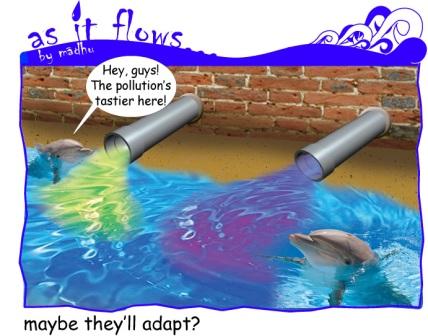
Augmenting groundwater resources by artificial recharge: A case study - Kolwan valley - A report by ACWADAM
Posted on 19 Jul, 2010 04:45 PM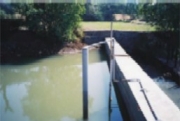 This report by ACWADAM describes the results of a research study conducted under the DFID funded AGRAR project at the Kolwan site in Pune district of Maharashtra state in India. The research focused on studying the usefulness of artificial recharge to augment groundwater resources through watershed development.
This report by ACWADAM describes the results of a research study conducted under the DFID funded AGRAR project at the Kolwan site in Pune district of Maharashtra state in India. The research focused on studying the usefulness of artificial recharge to augment groundwater resources through watershed development.
An important criterion of the study was also to understand the impact of artificial recharge on already changing livelihoods in areas where watershed development was conducted on a large scale.
A study of saline freshwater interface phenomena in the Mahanadi delta region (Orissa)
Posted on 10 Jul, 2010 10:40 PM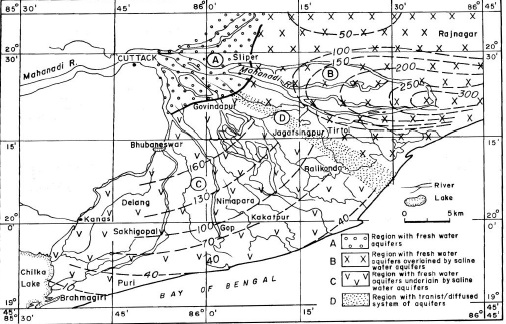 The subsurface aquifer systems in Mahanadi delta region in Orissa (India) is largely characterized by two groups of freshwater aquifer systems, both of which are prone to saline water mixing/migration with time and development:
The subsurface aquifer systems in Mahanadi delta region in Orissa (India) is largely characterized by two groups of freshwater aquifer systems, both of which are prone to saline water mixing/migration with time and development:
- The south western Mahanadi delta region is represented by unconfined to semi-confined freshwater aquifers underlained by brackish/saline aquifer systems with a diffusion boundary.
- The north eastern parts of Mahanadi delta is represented by deep freshwater confined aquifers overlained by brackish/saline water aquifers with aquitard/ aquiclude boundary.
Draft regulatory framework for wetlands conservation - Comments by ATREE
Posted on 09 Jul, 2010 11:49 PMThe Ministry of Environment and Forests released a draft of the regulatory framework for wetland conservation - Wetlands Conservation and Management Rules (2009) for feedback from all stakeholders. The draft framework was prepared by a multi-disciplinary expert group, and final round of comments were invited till June 21st 2010.
The Wetland Conservation Team of Ashoka Trust for Research in Ecology and the Environment (ATREE) did a detailed analysis of the draft regulation and submitted several pertinent concerns to the Ministry. The most significant observation is that the new framework (as do much of India's policies and laws) continues to propose unjustifiable State control and interventions over the country's wetlands and livelihoods of people dependent on them. The regulation does not make any constructive suggestions or recommendations for the conservation that the country's wetlands demand, and instead brings all wetlands into complete official control by installing Central, State and District-level wetland regulatory authorities, wherein the majority of the members will be senior government officials.
Renukaji Dilli Ke Nalon Mein - A documentary about the movement against the proposed Renukaji Dam Project
Posted on 18 Jun, 2010 05:22 PMThe Renuka Dam Project proposed over the river Giri Ganga (a tributary of the Yamuna) located some 300km away from Delhi, is a joint project of the governments of Himachal Pradesh (HP) and Delhi, to be constructed by the Himachal Pradesh Power Corporation Limited (HPPCL) in Sirmaur district of HP.

Activists from the Climate Revolution dig out climate policy gaps through the Right to Information Act
Posted on 10 Jun, 2010 07:27 AM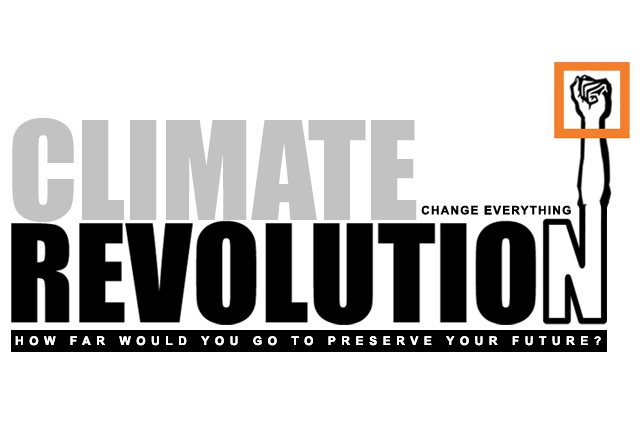 Content Courtesy: AlertNet
Content Courtesy: AlertNet
Activists from the Climate Revolution initiative in India have discovered a crucial tool in their battle to hold the government accountable on its climate policies: the country's landmark Right to Information (RTI) Act.
Read more about Climate Revolution's work on RTI on their website here.
Mukuteswara Gopalkrishnan to receive American Academy of Water Resources Engineers highest honor
Posted on 11 May, 2010 05:51 PMArticle and Picture Courtesy: American Academy of Water Resources Engineers

John J. Cassidy, Ph.D., P.E., Dist.M.ASCE, NAE, Hon.D.WRE, of Walnut Creek, California, and Mukuteswara Gopalakrishnan Hon.D.WRE, of New Delhi, India and the Secretary General of International Commission on Irrigation and Drainage (ICID) were recently elected the nineteenth and twentieth Honorary Diplomates of the American Academy of Water Resources Engineers. The Honorary Diplomate status is AAWRE's highest honor given to an individual. Since the founding of AAWRE in October 2004, twenty individuals have received the Honorary Diplomate, Water Resources Engineers (Hon.D.WRE) status from the Academy.
Honorary Diplomate status is only granted to outstanding individuals who meet one or more of the following criteria: has attained a position of eminence in the water resources engineering profession, has made a singular noteworthy achievement or sustained noteworthy contributions to the advancement of the water resources engineering profession, or has rendered outstanding service over a sustained period of time in the field of water resources and to the work of the Academy.
Upcoming training programmes by Sambodhi Research & Communications, New Delhi
Posted on 03 May, 2010 10:55 AMOrganizer: Sambodhi Research & Communications Pvt. Ltd
Venue: New Delhi
Description:
Excella Orbit, a training division of Sambodhi Research & Communications Pvt. Ltd., is pleased to announce the following training programmes;
The Evaluation Conclave 2010, Sambodhi Research & Communications, New Delhi
Posted on 01 May, 2010 02:45 PMEvaluation Conclave 2010
Theme: "Making Evaluation Matter"
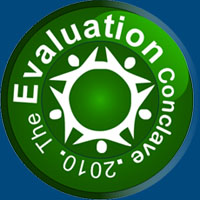
Organizers:
- Sambodhi Research and Communications
- Community of Evaluators (COE)
- Association for Stimulating Knowledge (ASK)
Venue: New Delhi, India
Description:
The event will attract global thinkers engaged in innovative evaluation research, theorizing, or practice who seek opportunities to push their thinking in new directions and are interested in applying their ideas in a South Asian context. It will also include leading development theorists, thinkers, activists and policy makers from South Asia to embed discussions in current development issues and contexts that evaluation must respond to.





